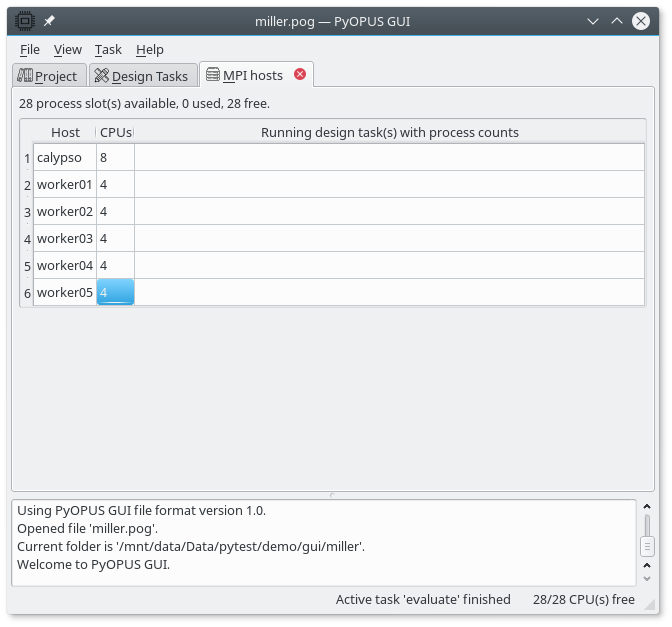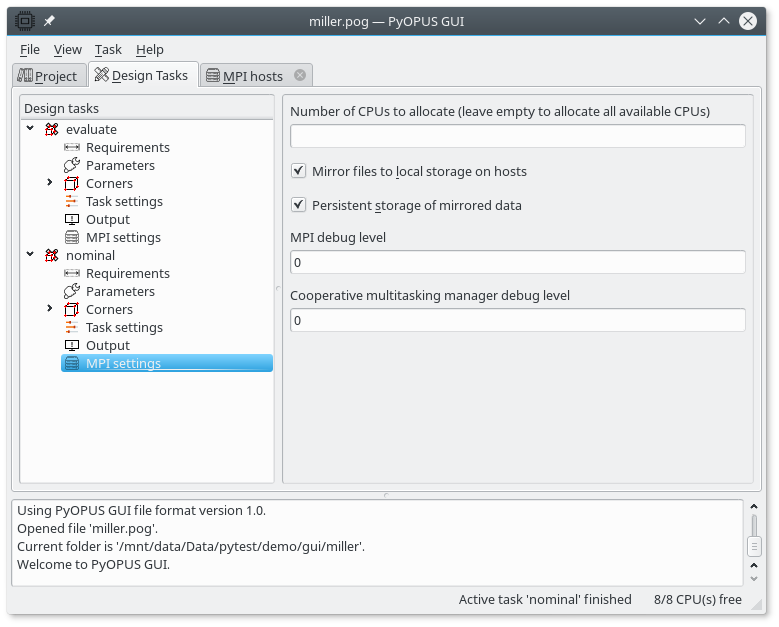11.6.1. Prerequisites for successfull parallelization
First of all, the mpi4py library must be installed. This library is a wrapper around some MPI library. We will assume throughout this section that under Linux the OpenMPI library is the one that is wrapped. For Windows we will assume mpi4py wraps the Microsoft MPI library. Under Linux usually the package manager handles the installation of OpenMPI automatically when you install mpi4py. Under Windows you must manually install Microsoft MPI.
If you are going to use CPUs across multiple hosts you will need to set up a
folder that will be shared across all hosts. One way to achieve this is under
Linux is to set up a NFS shared folder. It is common that the /home folder
is mounted via NFS on all machines in a cluster. In this case all you need to
do is to keep all of your projects somewhere under /home. If. however the
shared folder is not mounted on the same mountpoint across all hosts you must
define an environmental variable PARALLEL_MIRRORED_STORAGE on every host
that will be used. The variable is a colon separated list of mountpoints.
An entry in the variable’s value is assumed to represent the same physical
storage on all hosts where the variable is defined.
Design tasks can generate a lot of output files. These files are read by
components of PyOPUS. This can easily saturate the network connection when
shared folders are used. Therefore PyOPUS can perform most of disk read/write
operations on the local dis of the machine. By default local files are written
to the temporary folder (/tmp under Linux). If, however, this folder is not
local or does not have a sufficient amount of available space you can use a
different folder by defining the PARALLEL_LOCAL_STORAGE environmental
variable on every host where you don’t want to use the temporary folder.
When using Microsoft MPI under Windows you must start a program named smpd on every host that is going to run PyOPUS tasks by starting a command prompt and typing
smpd -d 3
The -d 3 option will enable debug output which will help you solve
problems with your MPI setup.
The GUI autodetects the number of CPUs on the local machine. If you want to also use remote machines in your parallel runs you must specify the hosts by choosing View/MPI hosts in the main menu and add entries to the table of hosts specifying the hostname and the number of available CPUs for every host.

Defining available hosts and CPU counts.
In the right part of the status bar the number of free and the number of available CPUs are displayed.

MPI settings of a task.
Every task has an “MPI settings” item. Here you can limit the number of CPUs that will be used when the task is run in parallel. If nothing is specified the task will use all available CPUs in the cluster.
The “Mirror files to local storage” option enables the creation of a local folder for every processor that is running a task via MPI. The files listed under the Files item in the Project tree are copied (mirrored) to the local folder so that the task is executed in the same environment as it would be if run locally. Make sure you list all relevant files under the Files item or your remote tasks will produce errors and fail.
Enabling the “Persistent storage of mirrored data” option will force PyOPUS to create a local folder and mirror the files only once for every task execution. If disabled, a new local folder is created for every job that is outsourced by PyOPUS. This can be expensive and significantly slow down the optimization run. On the other hand, when experiencing problems, turn off this option. If the behavior improves you probably hit a bug in PyOPUS or have bad luck because PyOPUS reused an old local folder (this can happen if the remote task has the same PID as a task that was run in the past). To avoid the latter make sure the local storage is cleaned up when a host is started.
“MPI debug level” sets the verbosity level of the MPI module in PyOPUS. This option is intended for PyOPUS development.
“Cooperative multitasking manager debug level” sets the verbosity level of the cooperative multitasking OS in PyOPUS. This OS is responsible for distributing jobs across CPUs. The option is intended for PyOPUS development.